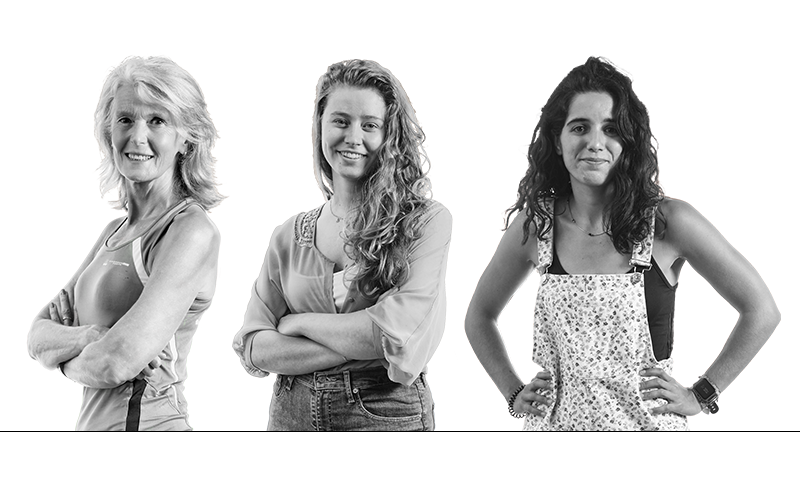A sign saying ‘no crop tops’ at the door of the gym provoked discussion among Wageningen students as to whether Sport Centre Bongerd (SCB) should have a dress code. Resource attended a discussion about crop tops in a group including students Claudia Espejo Valle-Inclan and Iris van den Belt and sports instructor Ellen van Kalsbeek. The discussion was moderated by the SCB director, Henri ten Klooster.

Ellen: ‘I’ve been a sports instructor since 2002. We have unwritten rules at the sports centre. They come down to: keep your chest, butt and belly covered – in other words “suitable sportswear”. The sports centre opened again on 19 May after the Covid-19 closure. We had hired new sports assistants and they had some unpleasant discussions with students about their clothing. So to protect these assistants, I turned the unwritten rules into a house rule, ‘no crop tops’. This guideline had no sexual associations for me; it was similar to ‘no flip-flops’.
Claudia: ‘I came into the gym one Monday. I was wearing a crop top because it was a very hot day. I saw a sign saying ‘no crop tops’ and I saw people in the gym staring at me. I felt very uncomfortable. I stayed, but I felt picked on. I spoke to another girl in the gym about it and she told me the instructor had told her to cover herself up, and that she wasn’t dressed decently. I talked about it with my friends later and we all felt we didn’t want to be targeted like this. Women wear crop tops. What’s the problem!?’
Why should I cover up my tummy but not my biceps?
Claudia Espejo Valle-Inclan
Ellen: ‘The student weightlifting club Wageningen Beasts started out as a group of muscular men who threw weights and barbells around, intimidated other people and wore vests. Other users, especially women, felt uncomfortable in that atmosphere, so we decided to set up a a dress code then. It had a positive effect, and now Wageningen Beasts is a club with more women members than men.’

Iris: ‘Yes, I read that explanation, but I don’t agree with it. It’s wrong to ban crop tops for that reason. That was a case of bad behaviour. If you don’t want that kind of behaviour, you must make rules that prohibit that behaviour. Crop tops are gym wear, and they are normal clothing to me. By prohibiting them, you imply that it makes a different what you wear. Whereas the issue is behaviour that makes other people uncomfortable. I don’t mind what other gym members wear, as long as they don’t bother me.’
Ellen: ‘I agree that the sign was not well-chosen. I apologize for that. Let’s forget this sign, and maybe we can skip the crop top rule. What we want is a diverse and inclusive sports centre. We have a very diverse group of students and staff. We also see that fashions change and that people want to show their bodies more than they did a few years ago. But that might be intimidating for other users too.’
Wearing a T-shirt is a small sacrifice to make for an inclusive sports centre
Ellen van Kalsbeek
Claudia: ‘A few students I know were told by the fitness instructors in front of the group that they were not supposed to wear crop tops. To me, that’s intimidating. I don’t see a difference between my belly and my biceps. Why should I cover up my belly but not my biceps?’
Henri: ‘The rule we created to make women feel more at ease in the gym has turned against us. None of the fitness instructors has a problem with crop tops. What we’re concerned about is the users. We always ask students whether they feel safe.’
Iris: ‘Feeling safe has to do with other people’s behaviour, not with clothing. So banning items of clothing doesn’t make sense.’
Henri: ‘Other international students have told me they feel differently about clothes and bare bellies.’

Claudia: ‘They must respect our customs. If I go to a traditionally religious country, I cover up my belly. But we are in the Netherlands, where people are free to wear what they like. This is a Dutch gym. We are free women and we can wear what we like. I’m not giving up my freedom because they are not comfortable with it.’
Ellen: ‘Wearing a T-shirt is a small sacrifice to make for an inclusive sports centre. If I go to other gyms in Wageningen, I enter a totally different atmosphere. Everyone there is under 30 and they all look extremely fit and muscular.’
Iris: ‘What is the proposal now?’
Ellen: ‘I say we want chests and butts covered in the gym.’
Claudia: ‘I’ve never seen anyone in a bikini in the gym, so I see no need for signs.’
Henri: ‘Let’s just say that users should wear appropriate clothing and not specify it any further. I propose that we meet again in October to evaluate this guideline.’
What do you think? Respond to this article on Resource-online.nl

 From the left.: Ellen van
Kalsbeek, Iris van den Belt, Claudia Espejo Valle-Inclan. Photo: Guy Ackermans
From the left.: Ellen van
Kalsbeek, Iris van den Belt, Claudia Espejo Valle-Inclan. Photo: Guy Ackermans ![[Comment] Standing up for science](https://www.resource-online.nl/app/uploads/2025/10/shutterstock_2641511707.jpg)

